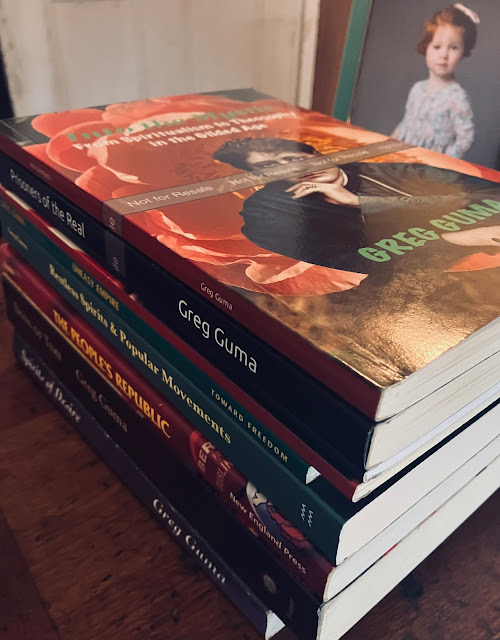By Greg Guma
We must reconcile two realms of experience that have long been viewed as separate — the political and spiritual. The keys to a synthesis have been found in ecological consciousness and the post-modern politics of Gaia.
Community begins when its members see their common purpose and relation to the whole, a living togetherness that is the essence of sister and brotherhood. In that sense, few true communities currently exist in our post-modern world.
Most of our cities and towns have no real centers, and we devote little time to defining what holds us together. That work has mostly been turned over to elected representatives and appointed bureaucrats. Their "rational collectives" leave little space for warmth or friendship in the press of political and economic reality. Visions of togetherness are usually viewed as romantic fantasy, conceivable at all only in terms of their concrete effects.
 |
| Order Here |
The Dionysian path is known by many names — metaphysical reconstruction, holistic epistemology and deep ecology, among others. Critics rightly note that attacks on rationalism and "instrumental reason" often go too far, ending in rejection of all forms of purposeful activity and a retreat into the mystical haze of nature worship and “magical thinking.” Wary of the cult of technique, cultural revolutionaries sometimes confuse technology with practice and reject all human inventiveness as wanton dominance. In truth, however, it is possible to make peace with nature even while acknowledging the separation created by our consciousness. As Christopher Lasch explained, "Nature sets limits to human freedom, but it does not define freedom."
Ecological and systems thinking provide a theoretical foundation for the Dionysian approach. The former encompasses the realization that structures that may appear rigid in nature are actually manifestations of processes in continual flux; the latter has moved beyond analysis of complex machines to an understanding of relationships and integration in living systems. After 2000 years of reducing the world to smaller and smaller building blocks, science has finally turned its attention to principles of organization. Every organism is an integrated whole, a living system. Families and communities exhibit the same characteristics of wholeness as cells and ecosystems.
Yet this metaphysical reconstruction also involves reconciliation of two realms of experience that have long been viewed as separate — the political and spiritual. Marx's claim that religion is the "opiate of the people" has been as debilitating as the notion that enlightenment is a purely personal pursuit, fundamentally incompatible with the "dirty" world of social action.
The keys to a synthesis have been found in ecological consciousness and the post-modern politics of Gaia. Together they form a new cultural paradigm — planetary consciousness. With roots in myth, Gaia re-emerged as an hypothesis, out of research on the auto-regulation of the Earth as a living system. According to James Lovelock, originator of the hypothesis, "the entire range of living matter on Earth, from whales to viruses, can be regarded as a single entity." Studying the nature of Earth's atmosphere, he and other researchers discovered that it is not merely a biological product but instead an active system designed to maintain a chosen environment within the biosphere.
Since this initial research Gaia has developed as a theoretical and artistic context, embraced by social critics, articulated in music, and developed as an eco-social organizing principle. There is talk also of a Gaian mode of consciousness, one acknowledging that science has a myth-making quality. Closely linked to ecological concepts, Gaian consciousness recognizes that opposites can — in fact, must — coexist.
This emerging form of spirituality is politically consistent with certain strains of Green thinking, in particular deep ecology, holistic feminism, community-based populism, and bioregionalism. All of these incorporate a subtle awareness of the oneness of life, the interdependence of its limitless manifestations, and its cyclical processes of change and transformation. The sense that we are connected to the cosmos as a whole is a spiritual revelation that ties together the disparate expressions of this new consciousness.
In The Spiritual Dimension of Green Politics, Charlene Spretnak argued persuasively that Green concepts of inter-relatedness and sustainability open the way toward what she called postmodern spirituality. Human beings, she wrote, are social and interconnected, and the boundaries between us are more illusory than we normally think. Taking account of the nature reverence buried within most religious traditions, she concluded that a spiritual grounding can not only answer a deep hunger in modern experience, but also mesh comfortably with the Green tendrils that have sprouted around the world. Like others who are attempting to describe the next stage of humanity's journey, she found herself in a region where cosmic consciousness and political analysis meet.
The key to a new age, says historian William Irwin Thompson, is the acceptance of difference, "the consciousness of the unique that contributes to the understanding of the universal." The main danger is what he has labeled "collectivization through terror," the stamping out of differences. Just as mono-crop agriculture does violence to nature, a mono-crop society — essentially the extreme of an industrial mentality — would be deadly to human nature. Even Green politics, which may yet develop an ecology of consciousness, could instead become a fundamentalist ideology, rejecting flexibility and promoting a Luddite contempt for innovation.
"The real secret of freedom," Thompson once wrote, "seems to lie in the ability to deal with ambiguity, the capacity to tolerate noise and yet hear within its wild, randomizing abandon the possibilities of innovation and transformation."


